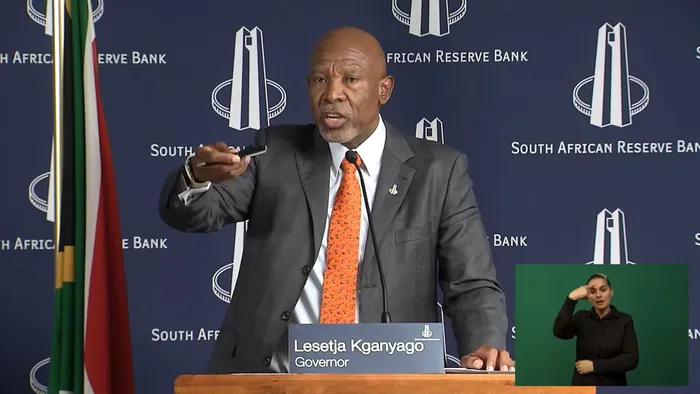
The South African Reserve Bank (SARB) governor Lesetja Kganyago. Picture: Screenshot from SAReserveBank live feed
Image: SA Reserve Bank.
There are strong calls for the South African Reserve Bank's (SARB) Monetary Policy Committee (MPC) to implement a significant interest rate cut of at least 50bps at its upcoming meeting.
Samuel Seeff, chairman of the Seeff Property Group, has issued this call following the latest unemployment figures, which he said painted a stark reality as another 237 000 South Africans lost their jobs in the first quarter, with unemployment now at 32.9% (up from 31.9%).
“Some 8.2 million people are now unemployed, and on the expanded definition it stands at 12.7 million (43.1%),” Seeff said.
The property group said this is further exacerbated by the IMF and Moody’s recently downgrading South Africa’s economic growth outlook for the year to around 1% at best, after growing at just 0.6% last year.
The continued economic stagnation and rising unemployment are simply untenable, says Seeff.
It said the risks to the stability of South Africa far outweigh the Reserve Bank’s overly cautious approach to inflation concerns, especially since inflation has trended around the bottom of the Reserve Bank’s target range since late last year, falling to just 2.7% for March.
It said this is below the target range.
The real estate company said the interest rate is still 100-basis points higher compared to the pre-Covid rate while the economy is stuttering and shedding jobs at an alarming rate. It should be noted too that the gap between the interest rate and inflation in South Africa is among the highest in the world, stifling growth, it added.
Seeff says the prolonged period of high interest rates has demonstrably hampered economic growth and placed significant strain on the economy and property market.
“The recent marginal rate cuts have now proven insufficient to stimulate meaningful recovery within the property market, with FNB recently reporting that sales volumes are still below pre-pandemic levels.
“We have recently seen the Bank of England and the European Central Bank cut their rates by 25bps. While the US Fed kept its rates unchanged, that was expected given the impact of the US-China trade war. On this front too, progress has been made with recent meetings between the US and China and a temporary tariff relief deal.”
Seeff said that means the bank’s primary justification for maintaining high interest rates has now diminished. He said inflation is below the target range, the global economy is settling, VAT has been scrapped, and after some volatility, the rand has stabilised.
“There is therefore no reason for the bank not to step in with a meaningful rate cut of at least 50bps. South Africa can no longer wait; the time for action is now,” Seeff said.
Meanwhile, Toni Anderson, head of home loans at Standard Bank, emphasised the significant strides women are making in the property sector.
"We are witnessing a remarkable shift in the demographics of homeownership. More women are entering the property segment than ever before, and they are playing an increasingly important role in managing homes and home finance," Anderson said.
"In 2024, we saw 4 831 new affordable housing mortgage customers, with 55% being female, amounting to R2.67 billion in loans. This is a notable increase from 2023, where 51% of our 4,659 new customers were women, with loans totalling R2.58 billion.”
This trend highlights the growing influence of women in the housing market and underscores the importance of supporting female homebuyers.
Standard Bank said its affordable housing loan book-covering households earning R3 500 to R22 000 or homes under R1 million-has grown significantly over the past year.
It said the number of loans increased from 95 654 valued at R32.63 billion in 2023 to 97 388 valued at R33.2 billion in 2024, representing a growth rate of approximately 1.8%.
This growth is a testament to the bank's commitment to making homeownership accessible to all South Africans, particularly those in the affordable housing segment.
“We understand the importance of owning a home,” Anderson explained.
“Homeownership is not just about having a place to live; it represents financial stability, generational wealth, and a sense of security. We are dedicated to helping our customers achieve this dream by providing comprehensive support and innovative solutions.”
Related Topics:
